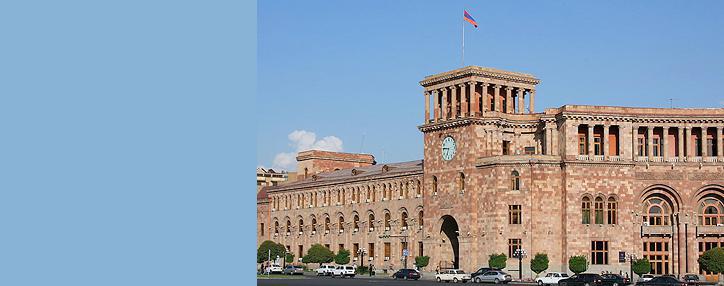Armenia’s Government rejects oppositional bill on majoritarian system abolishment
18.10.2012,
13:45
Armenia’s government again rejected the opposition’s bill on majoritarian electoral system abolishment, which implies a shift to 100 percent proportional system.

YEREVAN, October 18. /ARKA/. Armenia’s government again rejected the opposition’s bill on majoritarian electoral system abolishment, which implies a shift to 100 percent proportional system.
The bill was submitted by oppositional party Dasnaktsutyun.
The Armenian Revolutionary Federation Dasnaktsutyun and the Zharangutyun party submitted the bill for the parliamentary review in January. However, at that time, the parliament rejected it.
According to First Deputy Minister of Justice of Armenia Grigor Muradyan, Armenia’s government doesn’t find it rational to discuss this package of amendments, as majoritarian system along with proportional one ensures representation of interests of different social groups in the parliament.
“Due to this system, the voters who don’t want to give their voice to some political party or party bloc, can elect their candidate outside a party,” Muradyan clarified.
“This or that electoral system contributes to the efficiency of elections. Moreover, the majority of deputies are elected by proportional system, as their presence in the parliament is more dominant( 41 deputies are elected by majoritarian system, and 90- by proportional),” he added.
Muradyan also stated that a shift to 100% proportional system cannot be regarded as a progress in the current electoral system.
“We think, as the matters are now, this shift is quite premature.”—0-
The bill was submitted by oppositional party Dasnaktsutyun.
The Armenian Revolutionary Federation Dasnaktsutyun and the Zharangutyun party submitted the bill for the parliamentary review in January. However, at that time, the parliament rejected it.
According to First Deputy Minister of Justice of Armenia Grigor Muradyan, Armenia’s government doesn’t find it rational to discuss this package of amendments, as majoritarian system along with proportional one ensures representation of interests of different social groups in the parliament.
“Due to this system, the voters who don’t want to give their voice to some political party or party bloc, can elect their candidate outside a party,” Muradyan clarified.
“This or that electoral system contributes to the efficiency of elections. Moreover, the majority of deputies are elected by proportional system, as their presence in the parliament is more dominant( 41 deputies are elected by majoritarian system, and 90- by proportional),” he added.
Muradyan also stated that a shift to 100% proportional system cannot be regarded as a progress in the current electoral system.
“We think, as the matters are now, this shift is quite premature.”—0-



